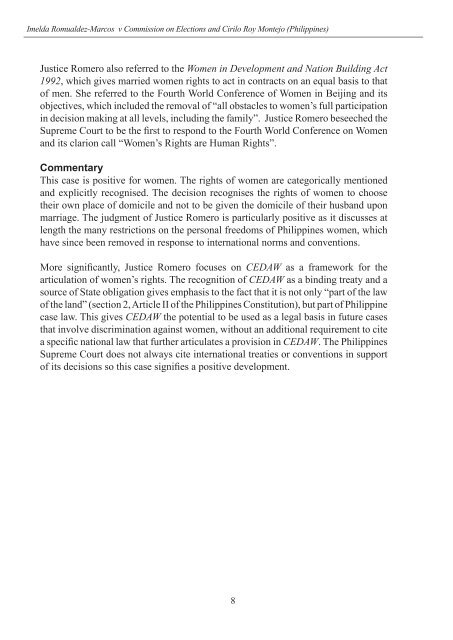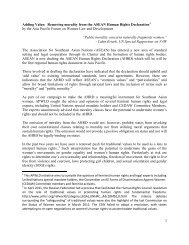A Digest of Case Law on the Human Rights of Women - Asia Pacific ...
A Digest of Case Law on the Human Rights of Women - Asia Pacific ...
A Digest of Case Law on the Human Rights of Women - Asia Pacific ...
Create successful ePaper yourself
Turn your PDF publications into a flip-book with our unique Google optimized e-Paper software.
Imelda Romualdez-Marcos v Commissi<strong>on</strong> <strong>on</strong> Electi<strong>on</strong>s and Cirilo Roy M<strong>on</strong>tejo (Philippines)<br />
Justice Romero also referred to <strong>the</strong> <strong>Women</strong> in Development and Nati<strong>on</strong> Building Act<br />
1992, which gives married women rights to act in c<strong>on</strong>tracts <strong>on</strong> an equal basis to that<br />
<str<strong>on</strong>g>of</str<strong>on</strong>g> men. She referred to <strong>the</strong> Fourth World C<strong>on</strong>ference <str<strong>on</strong>g>of</str<strong>on</strong>g> <strong>Women</strong> in Beijing and its<br />
objectives, which included <strong>the</strong> removal <str<strong>on</strong>g>of</str<strong>on</strong>g> “all obstacles to women’s full participati<strong>on</strong><br />
in decisi<strong>on</strong> making at all levels, including <strong>the</strong> family”. Justice Romero beseeched <strong>the</strong><br />
Supreme Court to be <strong>the</strong> first to resp<strong>on</strong>d to <strong>the</strong> Fourth World C<strong>on</strong>ference <strong>on</strong> <strong>Women</strong><br />
and its clari<strong>on</strong> call “<strong>Women</strong>’s <strong>Rights</strong> are <strong>Human</strong> <strong>Rights</strong>”.<br />
Commentary<br />
This case is positive for women. The rights <str<strong>on</strong>g>of</str<strong>on</strong>g> women are categorically menti<strong>on</strong>ed<br />
and explicitly recognised. The decisi<strong>on</strong> recognises <strong>the</strong> rights <str<strong>on</strong>g>of</str<strong>on</strong>g> women to choose<br />
<strong>the</strong>ir own place <str<strong>on</strong>g>of</str<strong>on</strong>g> domicile and not to be given <strong>the</strong> domicile <str<strong>on</strong>g>of</str<strong>on</strong>g> <strong>the</strong>ir husband up<strong>on</strong><br />
marriage. The judgment <str<strong>on</strong>g>of</str<strong>on</strong>g> Justice Romero is particularly positive as it discusses at<br />
length <strong>the</strong> many restricti<strong>on</strong>s <strong>on</strong> <strong>the</strong> pers<strong>on</strong>al freedoms <str<strong>on</strong>g>of</str<strong>on</strong>g> Philippines women, which<br />
have since been removed in resp<strong>on</strong>se to internati<strong>on</strong>al norms and c<strong>on</strong>venti<strong>on</strong>s.<br />
More significantly, Justice Romero focuses <strong>on</strong> CEDAW as a framework for <strong>the</strong><br />
articulati<strong>on</strong> <str<strong>on</strong>g>of</str<strong>on</strong>g> women’s rights. The recogniti<strong>on</strong> <str<strong>on</strong>g>of</str<strong>on</strong>g> CEDAW as a binding treaty and a<br />
source <str<strong>on</strong>g>of</str<strong>on</strong>g> State obligati<strong>on</strong> gives emphasis to <strong>the</strong> fact that it is not <strong>on</strong>ly “part <str<strong>on</strong>g>of</str<strong>on</strong>g> <strong>the</strong> law<br />
<str<strong>on</strong>g>of</str<strong>on</strong>g> <strong>the</strong> land” (secti<strong>on</strong> 2, Article II <str<strong>on</strong>g>of</str<strong>on</strong>g> <strong>the</strong> Philippines C<strong>on</strong>stituti<strong>on</strong>), but part <str<strong>on</strong>g>of</str<strong>on</strong>g> Philippine<br />
case law. This gives CEDAW <strong>the</strong> potential to be used as a legal basis in future cases<br />
that involve discriminati<strong>on</strong> against women, without an additi<strong>on</strong>al requirement to cite<br />
a specific nati<strong>on</strong>al law that fur<strong>the</strong>r articulates a provisi<strong>on</strong> in CEDAW. The Philippines<br />
Supreme Court does not always cite internati<strong>on</strong>al treaties or c<strong>on</strong>venti<strong>on</strong>s in support<br />
<str<strong>on</strong>g>of</str<strong>on</strong>g> its decisi<strong>on</strong>s so this case signifies a positive development.<br />
8



